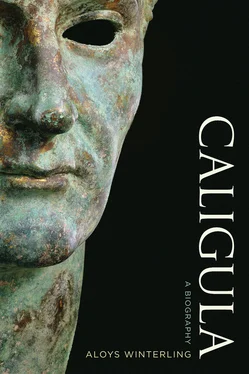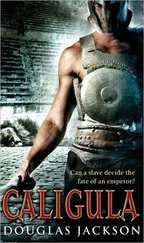Reshaping the Emperor’s Role
Powerful freedmen under Augustus:Juvenal 1.109, 14.305–8; Suetonius, Augustus , 67.1; Dio, Roman History , 54.21.3–8. Under Tiberius:Josephus, Jewish Antiquities , 18.167; Tacitus, Annals , 6.38.2. Caligula’s aristocratic retinue in public:Josephus, Jewish Antiquities , 19.102. Nymphidia:Plutarch, Galba , 9. Callistus and Domitius Afer:Dio, Roman History , 59.19.6, 59.20.1. Callistus’s position:Josephus, Jewish Antiquities , 19.64–65; cf. Dio, Roman History , 59.25.7–8 (Zonaras). Helicon:Philo, The Embassy to Gaius , 166–83, 203, 205. Role of Caesonia and the Praetorian prefects:Suetonius, Gaius Caligula , 25.3 f.; Dio, Roman History , 59.25.7 (Zonaras and the Excerpta Vaticana ); Persius 6.43–47. Imperial procurators, officers of the Praetorian Guard:Suetonius, Gaius Caligula , 47; Josephus, Jewish Antiquities , 19.28–29; Suetonius, Gaius Caligula , 40.
Triumphantly Crossing the Sea
Presence near Rome in May 40: Acta Fratrum Arvalium: Smallwood, Documents , no. 10, p. 14, l. 15. Delegation from the Senate:Philo, The Embassy to Gaius , 181. Journey to Campania:Philo, The Embassy to Gaius , 185. Bridge of ships from Puteoli:Seneca, On the Shortness of Life ( De Brevitate Vitae ), 18.5; Josephus, Jewish Antiquities , 19.5–6.; Suetonius, Gaius Caligula , 19.32.1 (and, on Alexander’s breastplate, 52); Dio, Roman History , 59.17. (Dating according to the indications given by Seneca and Josephus; Cassius Dio places the event in the year 39 without providing a context.)
CHAPTER 4. FIVE MONTHS OF MONARCHY
Subjugating the Aristocracy
Entrance into Rome:Suetonius, Gaius Caligula , 49.2. Instances of torture under Tiberius:Suetonius, Tiberius , 58; Dio, Roman History , 57.19.2. Plans to eliminate the entire Senate:Seneca, On Anger ( De Ira ), 3.19.2; Suetonius, Gaius Caligula , 49.2; cf. Dio, Roman History , 59.25.5. Regular executions:Seneca, On Anger ( De Ira ), 3.19.1; Suetonius, Gaius Caligula , 32.1; cf. 27.3. Julius Canus:Seneca, On Tranquility of Mind ( De Tranquillitate Animi ), 14.4–10; Boethius, Consolation of Philosophy ( Consolatio Philosophiae ), 1.4.90–94; cf. Plutarch, frg. 211. Ten-day interval between sentencing and execution in trials for maiestas: Tacitus, Annals , 3.51.2. Julius Graecinus( Prosopographia Imperii Romani 2, I 344): Seneca, On Favors ( De Beneficiis ), 2.21.5; cf. Seneca, Moral Epistles ( Ad Lucilium Epistulae Morales ), 29.6; Tacitus, Agricola , 4.1. Agricola’s birth( Prosopographia Imperii Romani 2, I 126): Tacitus, Agricola , 44.1. Pomponius and Quintilia:Josephus, Jewish Antiquities , 19.32–36 (Pompedius); Suetonius, Gaius Caligula , 16.4 (without mention of the name); Dio, Roman History , 59.26.4 (Pomponius). Sextus Papinius( Prosopographia Imperii Romani 2, P 101), Betilienus Bassus( Prosopographia Imperii Romani 2, B 114): Seneca, On Anger ( De Ira ), 3.18.3–19.5; Dio, Roman History , 59.25.5b–7. C. Anicius Cerialis( Prosopographia Imperii Romani 2, A 594): Tacitus, Annals , 15.74.3, 16.17.5. Protogenes in the Senate:Suetonius, Gaius Caligula , 28; Dio, Roman History , 59.26.1–2. The emperor’s guard in the Senate:Suetonius, Augustus , 35.1 (Augustus); Dio, Roman History , 58.17.3–4. (Tiberius). Testimony by slaves against their masters:Josephus, Jewish Antiquities , 19.12–14; under Tiberius:Dio, Roman History , 57.19.2; under Claudius:Dio, Roman History , 60.15.5. Claudius on trial:Josephus, Jewish Antiquities , 19.12–14; Suetonius, Claudius , 9.1. Aristocratic hostages on the Palatine Hill:Suetonius, Gaius Caligula , 41.1; Dio, Roman History , 59.28.9. Living in Augustus’s palace:Dio, Roman History , 53.27.5; in Galba’s palace:Suetonius, Galba , 14.2. Aristocrats’ criticism of Seneca:Tacitus, Annals , 13.42; Dio, Roman History , 61.10.1–3.
Dishonoring the Aristocracy
Reserved seating at the theater abolished:Josephus, Jewish Antiquities , 19.86; Suetonius, Gaius Caligula , 26.4. Claudius in the Senate:Suetonius, Claudius , 9.2. Dishonoring the noble families:Suetonius, Gaius Caligula , 34.1, 35.1. Pompeius Magnus( Prosopographia Imperii Romani 2, P 630): Inscriptiones Latinae Selectae 9339; Syme, Roman Revolution , 468. Pompeius’s end:Seneca, Apocolocyntosis , 11.2; Suetonius, Claudius , 29.1–2; Dio, Roman History , 61(60).29.6a. Flattery continues:Philo, The Embassy to Gaius , 116. Senators at banquets:Suetonius, Gaius Caligula , 26.2. Submissiveness of aristocrats under Augustus and Tiberius:Tacitus, Annals , 1.2.1, 1.7.1, 1.74.2. Kissing Caligula’s foot:Dio, Roman History , 59.27.1; Seneca, On Favors ( De Beneficiis ), 2.12.1–2 (Pompeius Poenus). Kissing actors:Suetonius, Gaius Caligula , 55.1. Gratitude for a kiss from the emperor mentioned in the Senate:Dio, Roman History , 59.27.1. Caligula’s rhetorical abilities:Josephus, Jewish Antiquities , 19.208; Tacitus, Annals , 13.3.2; Suetonius, Gaius Caligula , 53.1.
The Emperor as “God”
L. Vitellius:Dio, Roman History , 59.27.5. Dating of his recall from Syria:Malalas 10.244 (with confusion about the name); cf. Josephus, Jewish Antiquities , 18.261, and Dio, Roman History , as above. Senate decree to build a temple to Caligula:Dio, Roman History , 59.28.2; priesthood for his cult:Dio, Roman History , 59.28.5. Divine honors for Caesar:Dio, Roman History , 44.6.4. The sacrae occupationes of Tiberius:Suetonius, Tiberius , 27. Offerings to images of Tiberius and Sejanus:Dio, Roman History , 58.4.4. A senator prostrates himself:Tacitus, Annals , 1.13.6. Octavian’s “banquet of the twelve gods”:Suetonius, Augustus , 70. Antonius:Plutarch, Antonius , 4.1–2, 24.3, 26.3, 60.2–3. Augustus’s refusal of divine honors:Suetonius, Augustus , 52; cf. Dio, Roman History , 51.20.6–7. Tiberius’s rejection of honors and criticism by the Senate:Tacitus, Annals , 4.37–38. Cult for Tiberius, Livia, and the Senate:Tacitus, Annals , 4.15.3; cf. 4.37–38. Divinity of the Senate:Talbert, Senate , 96–97. Caligula’s appearances costumed as a god:Philo, The Embassy to Gaius , 78–80, 93–97; Suetonius, Gaius Caligula , 52; Dio, Roman History , 59.26.10; cf. 59.26.5–7. On “religious policy”:Willrich, “Caligula,” 107–16. Suetonius on the emperor’s clothing: Gaius Caligula , 52. Epigraphic and numismatic evidence:Barrett, Caligula , 148–49. “Conversation” with the moon goddess:Dio, Roman History , 59.27.6. Apelles:Suetonius, Gaius Caligula , 33. Fee charged to enter the college of the emperor’s priests:Dio, Roman History , 59.28.5. Claudius’s prohibition of veneration as a god:Dio, Roman History , 60.5.4. Scribonius Largus: Compositiones ( praefatio ), 60, 163. Temple for Nero:Tacitus, Annals , 15.74.3. Seneca on Claudius’s “divine hand”:Seneca, On Consolation ( Ad Polybium de Consolatione ), 13.2; cf. Tacitus, Annals , 13.42; Dio, Roman History , 60.8.5. Pliny the Elder:Pliny, Natural History, praef . 11. Philo on Caligula’s deification: The Embassy to Gaius , 76 (the emperor’s paraplēxia ). Josephus, Jewish Antiquities , 18.256, 19.4 and 11. Cult of the emperor in Judaea:cf. Barrett, Caligula , 182–91. Intervention by Agrippa:Josephus, Jewish Antiquities , 18.289–301; Philo, The Embassy to Gaius , 276–329. Jewish delegation’s first audience:Philo, The Embassy to Gaius , 180–83; second audience:Philo, The Embassy to Gaius , 349–72. Josephus’s descriptions of Caligula before his murder: Jewish Antiquities , 19.87–104. Suetonius on the deification of Caligula: Gaius Caligula , 22.2–4; cf. 33, 52. Threat to Jupiter:Seneca, On Anger ( De Ira ), 1.20.8–9. The shoemaker who laughed:Dio, Roman History , 59.26.8–9.
Читать дальше




